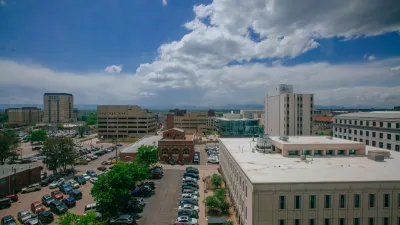A new argument has appeared in the ongoing debate about parking requirements. A university in a college town objected to reduced parking requirements on the grounds that it would make the city too attractive to developers.

Eric Jaffe provides a dispatch from the parking wars—this time in the college town of Champaign, Illinois, which recently debated relaxed parking requirements for residential development. Supporting the case for reducing parking requirements in the city were the usual arguments about lower housing costs and reduced auto dependence.
Opposing the parking reductions, however, were not the typical arguments about increased traffic and strain on public parking spaces. Jaffe explains:
"Instead, the University of Illinois at Urbana-Champaign 'respectfully opposed' the measure on the grounds that sites around town would suddenly become more attractive to private developers. Such sites—current parking lots the clearest example—would never pencil out into profitable building projects under the old rules, but became instantly viable without parking requirements. That bothered the university, which hoped to buy the sites on the cheap as the campus expanded."
Jaffe summarizes that argument by saying that the university is basically objecting on the basis that reduced parking requirements would make the city too nice. But looking at it from the university's point of view, new development potential for lots around campus conflicts with the university's master plan for expansion.
The article provides more details about exactly how Champaign's new parking policy would work, calling on Ben LeRoy of the Champaign planning department to describe the goals of the policy and the early positive response from the development community. LeRoy also tells Jaffe about how the city plans to work with the university to achieve their mutual goals in the future.
FULL STORY: An Unusual Objection to Less Parking: It Will Make Our City Too Nice

Alabama: Trump Terminates Settlements for Black Communities Harmed By Raw Sewage
Trump deemed the landmark civil rights agreement “illegal DEI and environmental justice policy.”

Planetizen Federal Action Tracker
A weekly monitor of how Trump’s orders and actions are impacting planners and planning in America.

Why Should We Subsidize Public Transportation?
Many public transit agencies face financial stress due to rising costs, declining fare revenue, and declining subsidies. Transit advocates must provide a strong business case for increasing public transit funding.

Understanding Road Diets
An explainer from Momentum highlights the advantages of reducing vehicle lanes in favor of more bike, transit, and pedestrian infrastructure.

New California Law Regulates Warehouse Pollution
A new law tightens building and emissions regulations for large distribution warehouses to mitigate air pollution and traffic in surrounding communities.

Phoenix Announces Opening Date for Light Rail Extension
The South Central extension will connect South Phoenix to downtown and other major hubs starting on June 7.
Urban Design for Planners 1: Software Tools
This six-course series explores essential urban design concepts using open source software and equips planners with the tools they need to participate fully in the urban design process.
Planning for Universal Design
Learn the tools for implementing Universal Design in planning regulations.
Caltrans
Smith Gee Studio
Institute for Housing and Urban Development Studies (IHS)
City of Grandview
Harvard GSD Executive Education
Toledo-Lucas County Plan Commissions
Salt Lake City
NYU Wagner Graduate School of Public Service





























